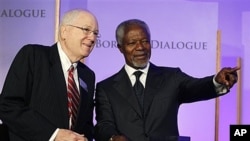Two former world leaders are being recognized for contributions to the fight against hunger during a ceremony in Des Moines, in the central U.S. state of Iowa.
The World Food Prize organization is awarding Ghana's John Agyekum Kufuor and Brazil's Luiz Inacio Lula da Silva for "visionary leadership" in reducing poverty and malnutrition in their countries over the past decade.
Kufuor's agriculture-focused economic reforms substantially boosted Ghana's economy, reducing poverty from 51.7 percent in 1991 to 26.5 percent in 2008. Under his government, school meal programs began to reach more than a million primary school students in a country of about nine million kids. During Kufuor's eight-year term, Ghana became the first country in sub-Saharan Africa to cut the percentage of hungry people by more than half from 1990 levels.
During da Silva's eight-year term, he made breakfast, lunch and dinner for all Brazilians a central goal of his administration, ensuring that more than 90 percent of the country's children ate three meals a day, while reducing the rate of extreme poverty from 12 percent in 2003 to less than 5 percent in 2009.
World Food Prize President Kenneth Quinn said da Silva's "Zero Hunger" policy strengthened family farms, cut poverty, and reduced child malnutrition by about 60 percent.
"President Kufuor and President Lula da Silva have set an incredibly powerful example for other political leaders in the world," Quinn said.
The two presidents will share the $250,000 prize, which will be presented on Friday, Oct. 14, at 0000 UTC, and will be live-stream broadcast at the World Food Prize website. It is the first time in the 25-year history of the World Food Prize that its top honor in food and agriculture has been awarded to heads of state.
The World Food Prize was established by plant breeder and 1970 Nobel Peace Prize winner Norman Borlaug, considered by many the father of the Green Revolution, which greatly increased rice and wheat yields and averted famine in Asia in the 1960s.
The prize, awarded annually to individuals who make significant contributions toward improving food quality, quantity or availability, typically goes to researchers, lawmakers and others who lead anti-hunger efforts around the world.
Some information for this report was provided by AP.




